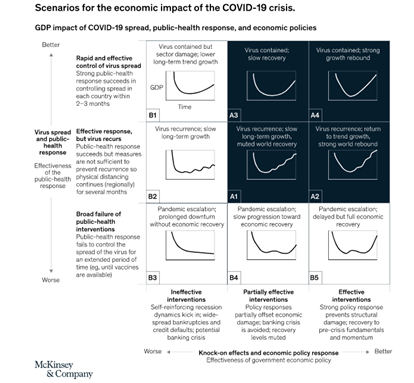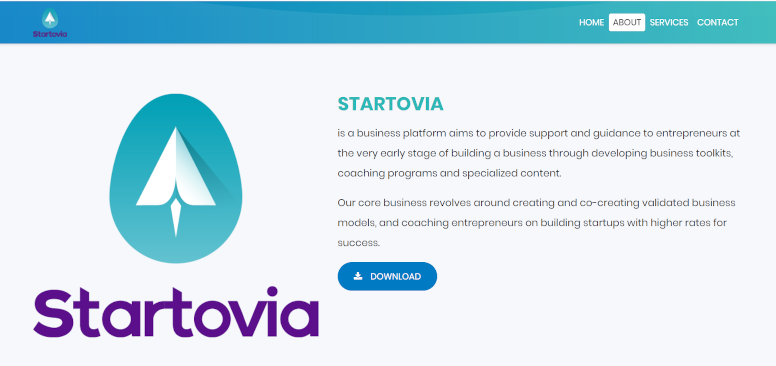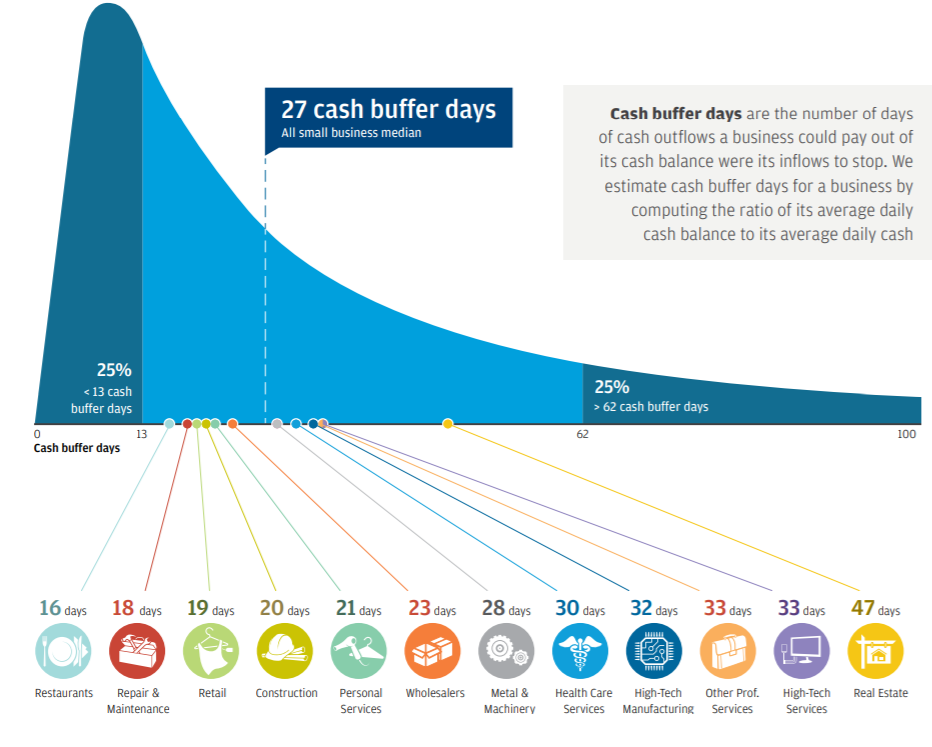The COVID- 19 virus nicknamed as the black swan, is an unpredictable event with consequences that exceeded our expectations. The current situation that we’re going through is characterized by its extreme rarity, intense impact, and widespread insistence that it was evident in hindsight. At times like these businesses look for crisis management techniques to help weather these hard times. In this guide, I’m gathering most of the main procedures and actions steps to have within the crisis or after to thrive your business. Let’s start!
Related: 10 ways for small businesses to weather the COVID-19 (coronavirus) pandemic
Overview of crisis management
The global early warning system, BlueDot, sends near real-time infectious disease alerts based on what’s relevant to you. It combines more than 100 datasets with proprietary algorithms to deliver critical insights on the spread of infectious diseases. BlueDot had spotted what would come to be known as COVID-19, nine days before the World Health Organization released its statement alerting people to the emergence of a novel coronavirus.
Experts suggest that the outbreak of the global economy due to the emerging Coronavirus will incur losses exceeding $160 billion, making this loss more than 4 times the cause of the SARS virus that invaded China in 2003. Also, evidence from past outbreaks strongly suggests that the virus will come back when the weather cools again or our vigilance flags. So, don't think we're all out of the woods come May.

Sectors will be affected to different degrees. Some sectors, like aviation, tourism, and hospitality, will see lost demand. This demand is largely irrecoverable. On the other hand, some sectors will see high demand like the digital industry, health & environment ones because they are needed to overcome the crisis and to run the daily life activities with minimum human interactions. Other sectors will see delayed demand like in consumer goods where customers may put off discretionary spending but will eventually purchase such items later, once the fear subsides and confidence returns.
Step Zero
Before you prepare a crisis management plan, you have to accept the crisis. There's no time for denial. When a disaster takes place, there's always some percentage of the population reluctant to accept it. Some initially feel confident that their businesses would be insulated or might even see an uptick. Others start seeing negative ramifications to their businesses right away and have been adjusting appropriately. The good news is that over the span of a couple of days, all businesses have come to recognize the changes the coronavirus is doing on an international level.
While it's true that some businesses will suffer more than others, none of us will emerge from this pandemic unscathed. Note that the startups or small businesses will be the least to be affected hardly from this crisis. Since they have the ability to change and adapt easily to the situation. I recommend all founders to make a brainstorming session with the core team to pivot their business models or launch a new product and align it with the current crisis. The idea could be related to your current customers or you can build a new track. I remember an investor said:
If a startup doesn’t thrive in such a crisis, he will never succeed!
Startups generally shows different ways for crisis management, here are some of them:
- Build new business models: Help Cairo, they launched this month. The idea is to help workers in retailers to stay afloat and be able to pay their workers. This will happen by enabling loyal customers to pay forward through buying discounted voucher cards from their favorite brands to be redeemed after the lockdown is over and with 1-year validity.
- Add a service serving the same sector they are in: Aumet is a medical marketplace that connects between manufacturers, distributors, and end-users. Prevent Coronavirus COVID-19 from spreading by supplying bulk orders for high quality Face Masks with full protection to minimize its spread. Also, Bilforn and Younear act as online grocery applications to its offering at their customers’ convenience, in support of the ''stay at home'' safety measures. These products include fruits, vegetables, groceries. Additionally, the companies applied special safety standards at all stages of production, packaging, and delivery.

- Provide a service in different sectors for temporary time to serve community needs: Jafarshop; A specialized website for selling the equipment and tools you need to do any maintenance for your home. Jafarshop's team decided to utilize their connections, resources, operation and supply chain to offer the main needs of food to families at home with one package.
- Digitize the service they are providing to their customers: Viavii, launches online experiences, bringing anyone and everyone online authentic cultural and artistic experiences, right from their living room. They translated going into self-quarantine to fun, entertaining and educational experiences.

Also, Robo Desk: is a customer communication platform that enables organizations to communicate with their customers effectively. You usually route your call center, social media and messaging channels to Robo Desk and it will handle them all in natural language! Imagine it as a bot but can talk to you with the Egyptian slang in a phone call in a natural way! Robo Desk used to install the communication kit on the clients’ infrastructure, but after the current situation they switched to a global telecommunication provider and started providing customers the entire call automation and infrastructure services.
- Tens of companies keep their brand awareness and enhance their online presence or participate with local initiatives to help citizens stay at home.
- Offer their services during the crisis (2-3 months) for free: Brainy Squad and Startovia; launched free online consultation sessions to support businesses facing economic consequences of the spread of COVID-19. These sessions provide expertise to help businesses adopt the best digital transformation tactics to ensure continuity and growth under the current conditions. This will give them a chance not only to help their customers, but also to lead generations and grow their customer base.

Remember this:
The sooner startup leaders move past denial and start mitigating the scope of the impact, the better off they and their many stakeholders will be.
Financial Issue
- Cut your burn rate: Another crisis management strategy is cost optimization whenever possible. It’s found that half of small businesses hold a cash buffer of less than a month.

In 2008, The world suffered from the Great Recession. While the coronavirus is probably not going to lead the USA or the world into a recession, it certainly will cause a significant disruption. Therefore the leading venture capital firm in Silicon Valley, Sequoia Capital, says:
Spend every dollar as if it were your last.
Probably this sounds a bit extreme, but you need to embrace the mentality that you need to protect the lifeblood of any business’ cash. Either cash going out in the form of expenses or cash coming in from revenues. You might also be able to negotiate with your suppliers or landlords, letting them know you need some form of cooperation in order to survive. At this tough time, survival matters more than market domination. So, take the necessary steps so that you come out of this disruption stronger than ever.
Examine the cash you have on hand and imagine how you could make it last for at least six to nine months. And if you don't have enough cash on hand, look at how you could cut expenses or increase sales by doing something different.
If you don't want to be a statistic, you absolutely must plan for at least a year of highly adverse
business conditions. And as the Prime Minister of Canada said:
For a little while... This will be our new normal.
- Review and restructure your contracts: As part of your burn rate review, look at your supplier agreements, lease agreements and other agreements that are costing you a lot of money and which you might do better without. If there's a force majeure clause that permits you to terminate the agreement, consider whether doing so might not be a bad idea.
If you know what the terms of your contracts are, this will help you to know which ones you can jettison. Even if you think you can't jettison them, it might be worth approaching your counter parties to try to restructure the deal. You won't get abatement in your rent or released from a fixed-term agreement if you don't ask for it. A mutually agreed negotiation ahead of time is nearly always preferable to acrimonious litigation after the fact. On the other hand, you have to keep all your investors up to date. Do this monthly if not weekly. In an email and direct and to the point.
- Plan for fundraise: Evgenia Plotnikova, partner at Dawn Capital, announced that Dawn portfolio companies have raised close to $200m this week. And she said: "We are open for business.” Also, Matthew Stafford, an angel investor in the UK, said he's "carrying on as normal for now". He has just invested in one company (for the third time) and is beginning due diligence on another. Other investors are less enthusiastic, however.
If you are looking to fund-raise, try and focus on revenue generation "Survival of the quickest - those who take big cuts early and re position fastest have a higher chance of surviving than those that take a wait and see gradual approach."
- Whatever the deal is, close it. Now: If there's a deal on the table - either an acquisition or a venture financing - on less than optimal but nonetheless acceptable terms, take it. Now is the time to go on offense in terms of closing any commercial transaction that will facilitate your business' short-term survival or any return of capital for yourself or your investors. VC investors are herd animals. Your startup is not at the top of their list.
Team Aspect in crisis management

- Be the leader your team needs right now: It's in moments of crisis that leaders reveal their true mettle. Nothing matters more than people. Winston Churchill said: "Things are not always right because they are hard, but if they are right one must not mind if they are also hard." So, work hard, care about your team and show it. Safety must always come first. If you can afford to keep paying contract workers whose jobs can't be done remotely, do so. If you can afford to offer paid sick leave to contractors, do that, too. And start by mandating telecommuting NOW.
- Over Communicate: Showcase understanding and empathy. The first job of early-stage founders isn't to protect their investors, but their employees. Cognizant that the formal legal duty of an officer of a company is to promote the success of the company for the benefit of its members, early-stage firms usually fall into one of two buckets - founder-owned, or founder-and-VC-owned - and the identity of the shareholders changes a lot about where a company's business priorities tend to lie. And as an investor once said:
Purely founder-owned companies tend to view their closest staff- who help the company make money- as assets, and regard VCs as a distraction.
Your employees are afraid right now. So are your customers, partners, and vendors. Even if you are physically distant, be visibly and emotionally present by the following:
- Communicate and then communicate some more.
- Conduct company and department-wide video conferences; aim for as many as 4 times your normal rate of Stand-Ups and All Hands.
- Replace assurances dependent upon your physical presence with frequent words of affirmation.
- Use emphatic language to communicate your support and enthusiasm over calls, texts, and email.
- Be sure to show empathy and flexibility. That guy whose kids are now e-learning may not be as productive as before, but he's trying his best. Show him your support.
- Delegate and distribute responsibilities across positions: Breaking down the operational decisions and autonomy of execution will remove single point decision dependencies. This, when supported by a strong decision-making framework implemented across the hierarchy will allow companies to operate with much more flexibility, relatively better productivity and cushion the impact of single point of decision source(s).
Business suffers when it loses customers. This is not the general case today- though this may eventually be the after-effect. Work is getting stalled and the impact is due to a sudden disruption of operations. Delegated on-the-ground decision making through empowered teams and micro leaders can help reduce collateral damage, mitigate unnecessary risks and identify and execute realistic and condition-specific contingency plans.
- Put in place a succession plan: In the eyes of a virus, a CEO and an intern are the same; indeed, if the CEO is older, the CEO is likely more vulnerable to the virus than more junior members of staff. So:
- DON’T give one person the keys to the entire kingdom.
- Have disaster recovery plans if one member of staff is taken ill or dies.
- lace a key chain of command so the company can continue operating as a going concern.
- Back up your data in multiple geographic locales.
- If you are hiring, make sure the roles are revenue-generating.
- If you need to take hard cost-cutting decisions with staff, take them now, don't delay the process.
Operation workflow during crisis management
- Do SWOT analysis: Coronavirus crisis is one of the threats you are facing, it’s not the only one. The SWOT analysis helps you to build on what you do well, to address what you're lacking, to minimize risks, and to take the greatest possible advantage of chances for success. It will also help you to have an action plan for at least the upcoming 6 months.
- Double your online presence: With the mess that will happen, you must double your efforts, highlight your services, and inform your followers that you are still following your business in a smooth manner. Also, messages of reassurance to your customers and partners must be sent through sympathy and keep the contacts between you for any future cooperation.
Related articles: How to make it easy for customers to contact you
- Digitize: This is easier said than done. Even a simple software to remotely manage a project takes a lot of time to implement-leave alone development. Yet, social distancing being the need of the hour, a tough call needs to be made if projects are to go into hibernation till a conducive time comes.
If one looks closely at the first two Ds, they give us a clue on who will do what. This kind of simplifies the complexity of the implementation of any digital system that can aid in the remote communication, management, and execution of the chosen set of activities.

A collaborative effort and co-decision with the customers are essential to make this work. Pulling in skilled staff- functional, technical and managerial to enable such processes and systems at a war footing by leveraging past experiences. Collaborators and focus groups can support. Technology companies have done it before-delivering rapid solutions to their customers. This is the moment of truth for them to turn around the situation & invoke all its experience, capabilities and deliver.
Related articles: 10 tactics to adapt your business for social distancing
- Reassess business as unusual: Today each of those plans must be re-evaluated. By nature, most startups (like humans) tend to overestimate what they can accomplish in a year and underestimate how much they will accomplish in five. Right now, many startup operating plans overestimate top line growth while underestimating the pandemic's impact. This double whammy must get baked into revised operating plans for 2020 and beyond. Remember that the risks of being under-prepared far outweigh any downsides of over-preparation.
- Sales Forecast: Examine or revise your sales forecasts. Don't fool yourself and believe your most optimistic projections. Get very realistic. The goal is not to hunker down and hide but to devise or brainstorm ways you could sell more of your products or services. Perhaps it's new markets, customers or leveraging a partnership.
- Don't just survive, thrive: The months ahead are going to be really freaking tough. But you're going to be amazed at the innovation and creativity that come from scarcity and reframed perspectives. Since in-person meetings with salespeople are no longer an option, more teams are going to hunker down and create products customers truly love.
Workflow automation will take center stage for almost every company that's selling products to
enterprises or consumers. There will be spikes in usage across a lot of products and services, many of which will return to pre-COVID-19 levels once we're on the other side. This period will also establish a "new normal" across a plethora of products and services and across brand new personas, which will pave the way for non-linear growth and the expansion of new markets. If you have the funding runway to do so, a recession is also a great time to make significant investments in core technology infrastructure and R&D, which can be hard to justify when times are good and that money can be efficiently spent on top-line growth.
Final words about crisis management
With all the negativity of having such a crisis, there will be always hope and a window for an opportunity to acquire. Airbnb was launched in the 2008/2009 crisis and now it has become a unicorn. In just 4 or 5 years, I guarantee there will be a unicorn launched in the COVID-19 crisis.
Many great companies have emerged from downturns stronger than ever. So have great ideas. In 1665 the University of Cambridge closed due to the Bubonic Plague, and its student Isaac Newton was forced to work at home for over a year. He used that time to work on mathematical problems which led to early calculus, and there, sometimes sitting under a now-famous apple tree, he developed his seminal theories on optics, gravity and motion. Maybe your company's own "apple falling" moment lies in the months ahead!
The crisis affects businesses worldwide, and some companies or governments take the responsibility to take founders’ hands and help them overcome meanwhile until they operate functionally and pay their burn rate with minimum cost. Here are some examples of crisis management:
- Facebook is offering $100M in cash grants and ad credits for up to 30,000 eligible small businesses in over 30 countries where we operate.
- GoDaddy is offering small businesses three months free of the email marketing tool packaged with a way to easily update customers via Facebook and Google My Business.
- Extending customer subscriptions to products or services such as Adobe
After every crisis, we will noticeably witness a change in customers’ buying behavior. Coronavirus (COVID-19), customers are forced to use electronic payments while companies paid too much on marketing awareness campaigns to let them try it. On the other hand, customers will buy from the easiest shop to reach or the one which delivers to home.
Coronavirus isn't something we'd have wished on anyone, but now that we're here, let's use this as an opportunity to hunker down, emphasize and rely on our own humanity, focus on what truly matters and see what magic emerges. And remember to prepare a crisis management plan, stay home and stay safe!





